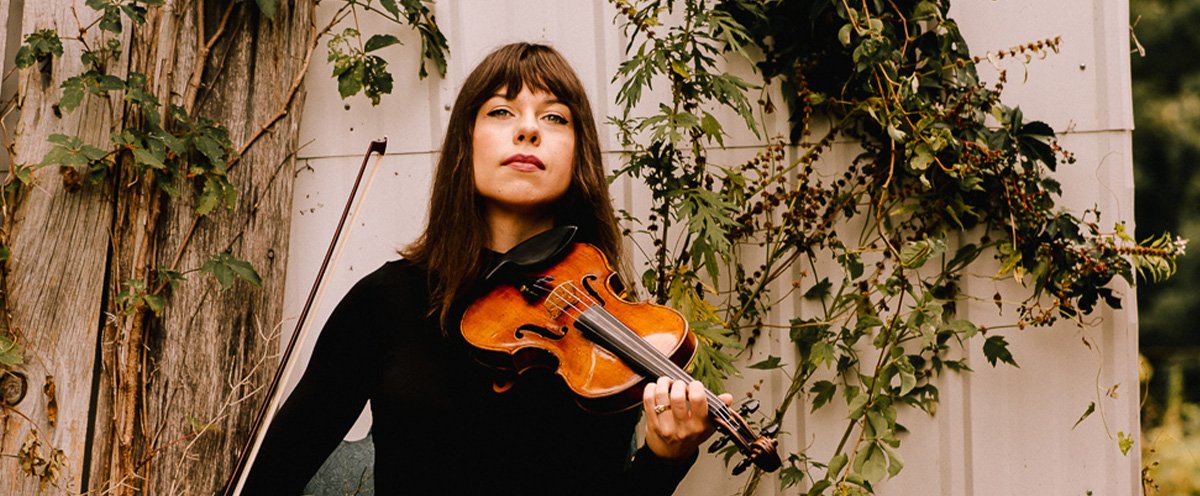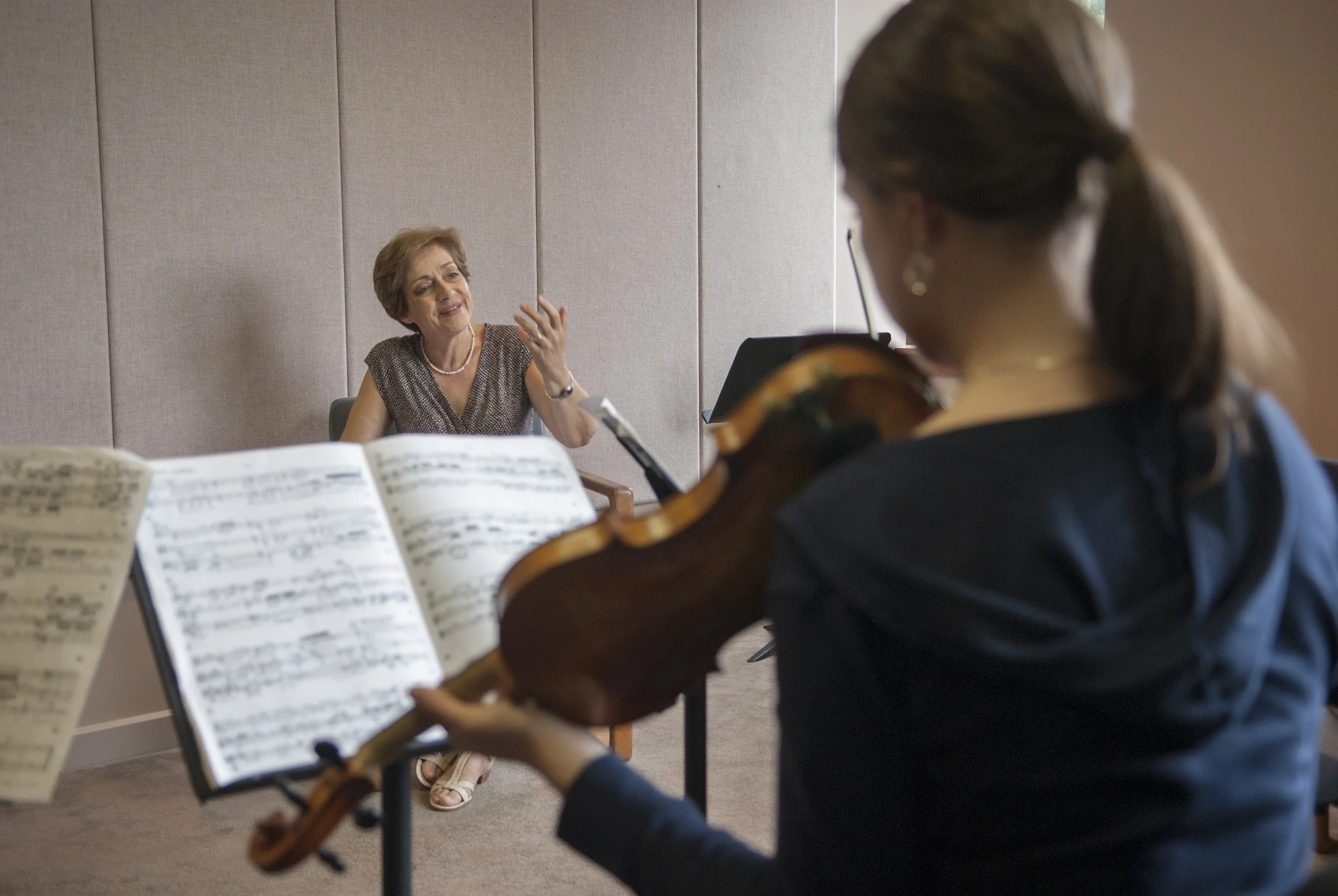True Tradition
By Donald Liebenson
There is a moment of sheer infectious joy on Ravinia Steans Music Institute alum Tessa Lark’s most recent album, The Stradgrass Sessions. There are several, actually, but one that stands out comes at the end of “Hysedelje,” a fiddle tune composed by Lark that is more (blue)grass than Strad(ivarius). At the end, she emits a “whoop” that evokes her Richmond, KY, roots as the daughter of a bluegrass musician. “It was a spur of the moment,” she told Ravinia. “Culturally, it is something you might do after playing a fiddle tune.” She added with a laugh, “You can take the girl out of Kentucky—”
Michael Thurber and Tessa Lark
Lark credits bassist, composer, and fiancé Michael Thurber for coming up with the genre-blending term “Stradgrass.” It came at a point when everything in Lark’s life was in flux. She had graduated from the New England Conservatory of Music and, after nine years in Boston, was gearing up to move to New York City, where she was giving a classical recital at that critical moment.
At the concert’s conclusion, she brought out Thurber, her banjo-player father, and another friend to perform a folk song. She was playing a Stradivarius on loan to her from having won the silver medal at the International Violin Competition of Indianapolis in 2014. “I announced to the audience that it felt a little sacrilegious to play fiddle music on the Strad,” she recalled. “Michael jumped in and said, ‘Strad Grass.’ I loved that so much, and over time it became a perfect term for this musical exploration. Bluegrass has been and will forever be a part of my life.”
She added, “I didn’t really have qualms about playing bluegrass on the Stradivarius. It just seemed like the right thing to say at a classical recital. That Strad made a mean fiddle.”
Lark was born to the breed. Her father plays with the gospel-bluegrass ensemble Narrow Road. Her mother played piano for almost a decade when Lark was growing up. Classical music made an impression on her via radio and Performance Today, the American Public Radio series hosted by Fred Child and reputedly the most listened-to classical music program in the country.
“I adored the music from a very young age,” she said. “My parents were amazing about having unique styles piping through the house. I would gravitate to what I thought was good music. It didn’t matter what the style or genre was. I quickly fell in love with classical because of the depth of emotion.”
Top 40 radio did not have the same pull on her, but she listened so she could sing along to the songs with her friends. “Otherwise, I was just in my corner loving the violin,” she said with a laugh. “Nobody else was interested in that, so I would listen to the radio all the time and get to know the songs. Now, in my 30s, I have a larger appreciation for that music. I live in Seattle, and Taylor Swift [on tour and in town at the time of our conversation] has taken over. I find her music really amazing.”
At the age of 6, Lark wanted to play the piano, but a local piano teacher advised the family that it would be easier to acquire a violin. She studied the Suzuki method for six years, and her teacher supplemented her lessons with fiddle books. As a pre-teen, her parents drove her to Cincinnati on weekends for Starling Preparatory Strings, an all-day Saturday program. As a young teen, she attended Mark O’Connor’s Fiddle Camps.
During her 2008 fellowship at Ravinia Steans Music Institute, Lark (second from right) was mentored by Miriam Fried throughout the five-week residency, including for a performance of Henri Dutilleux’s string quartet Ainsi la nuit alongside (counterclockwise from front) violist Vicki Powell, cellist Paul Dwyer , and violinist Wonhyee Bae.
In the summers of 2007 and 2008, she joined the distinguished cohort of artists whose classical music journeys took a leap forward at the Ravinia Steans Music Institute, where she was mentored by violinist Miriam Fried. In 2006, she had had what she jokingly refers to as “a bonus summer” at Steans studying with Fried, who would oversee her earning bachelor’s and master’s degrees at the New England Conservatory. “I got to see the magic that happened at Ravinia,” she said. “The music is wafting around and you can’t ignore it. It was my first encounter with the Chicago Symphony Orchestra. [Then Ravinia Music Director] James Conlon gave master classes. The Emerson Quartet gave a concert in the Martin Theatre. It was really miraculous.”
Lark’s first return to Ravinia after her fellowship was to participate in the annual spring tour of alumni in 2012, joining Fried for Bernard Rands’s Second String Quartet with now New York Philharmonic cellist Nathan Vickery and Aizuri Quartet co-founding violist Ayane Kozasa.
Her two years as a Steans fellow were “so formative for me,” she said. “It was my first summer after college and it opened a world into chamber music. It was at once exhilarating and intimidating. My first encounter with Ravel’s String Quartet was there. I had less than a week to learn it, and I remember freaking out as a 17-year-old. Now I know that’s par for the course, so I’m grateful for that experience. All the colleagues I worked with over those years are now still very much my colleagues and dear friends. It’s incredible how you can follow a lot of successful musicians’ paths from Ravinia Festival.”
As for bluegrass, it’s in the blood, she says. “It’s a combination of growing up in Kentucky and hearing that music and being of the generation of the New Grass movement with its marriage of styles. You’re seeing a lot of cross-pollination between virtuoso bluegrass players and classical musicians. Chris Thile comes to mind, playing the Barber Violin Concerto [on his mandolin] with a symphony orchestra.”
“Appreciating a work-life balance doesn’t mean that you’re not always a musician, it just means you respect downtime. It enhances the music making.”
Both classical and bluegrass have rich centuries-old traditions. Lark believes that knowledge of the past helps to keep the music moving forward rather than going in circles. But she also believes that “the beauty of music is originality. Our duty as musicians is to honor our individuality and our instincts.”
Among the musicians Lark admired and wanted to emulate were Yo-Yo Ma and Itzhak Perlman. “I have a clay model I made of Itzhak Perlman in my childhood bedroom,” she laughed. “I haven’t showed it to him. I should send him a picture.”
She admires Mark O’Connor traversing different musical genres. Through him, she said, she discovered bassist Edgar Meyer, whom she enthusiastically hailed as another musical hero. “He is a brilliant artist who will go to great lengths to honor the quality of artmaking. I absolutely adore and admire that in him, and it inspires me.”
Fried remains a profound influence. “Everything that comes out of her mouth is beautiful wisdom,” she said. Perhaps the best advice she received from her mentor was to appreciate a work-life balance. “A lot of musicians say their work is their life,” she said. “It sounds very romantic. But the older I get, the more I appreciate honoring that distinction. It doesn’t mean that you’re not always a musician, it just means you respect downtime. It enhances the music making.”
Another inspiring collaboration was with pianist Mitsuko Uchida. “She told me she started to play slower because she has a lot more to say. I thought that was a beautiful message about aging with music and finding more appreciation in every moment. That’s a life lesson as well.”
When Lark last appeared at Ravinia in 2014, she had won the Indianapolis Competition just a month earlier. Surrounding her concert, the violinist teamed up with Ravinia’s Reach Teach Play programs to be a Guest Artist in the Classroom for partner elementary schools in Lake County and Chicago.
Not surprisingly, Lark puts a great priority on arts education. “It’s what the world really needs now,” she said. “It gave me a sense of purpose growing up. It helped me find a connection with colleagues and a way to make friends, especially after the pandemic, when we all realized the importance of others. You can’t really make great music unless you’re connected with others. I’d say music is like sports in that respect. You have to strategize and collaborate and be creative and supportive. But, the extra elements the arts bring is harder to find in sports, and that is a nuance that we clearly need in the world right now, empathy and a sense of understanding and connection to a human citizen of the world. It’s a simple approach to let any young student find their way to whatever profession they may be interested in.”
Lark has accomplished much in her young career. She earned a Grammy nomination in 2020 in the Best Classical Instrumental Solo category for her debut recording, Michael Torke’s Sky, a concerto written specifically for her. Lincoln Center honored her with its Emerging Artist Award. She has been a featured soloist with orchestras around the world—“But not yet the Chicago Symphony Orchestra,” she said, something she is eager to rectify. It “just tickles me,” she said, that she is collaborating with her musical heroes, such as Edgar Meyer and violinist James Ehnes, the artistic director of the Seattle Chamber Music Society.
“I’ve spent several years listening to James Ehnes,” she said “I used to wear out his CDs. Now I’m in a group with Edgar Meyer and we play at James’s music festival. I have to pinch myself.”
Lark looks forward to returning to Ravinia on September 3 and to once again be playing in front of a live audience. “Such a relief,” she said. “I had all that pent-up energy with nowhere to go. I am resuscitated in a way when I get in front of an audience. I feel whole again.” ■
Donald Liebenson is a Chicago-based entertainment writer. His work has appeared in the Chicago Tribune, Chicago Sun-Times, Los Angeles Times, and on RogerEbert.com. The first Ravinia concert he attended without his parents was Procol Harum in 1970.







